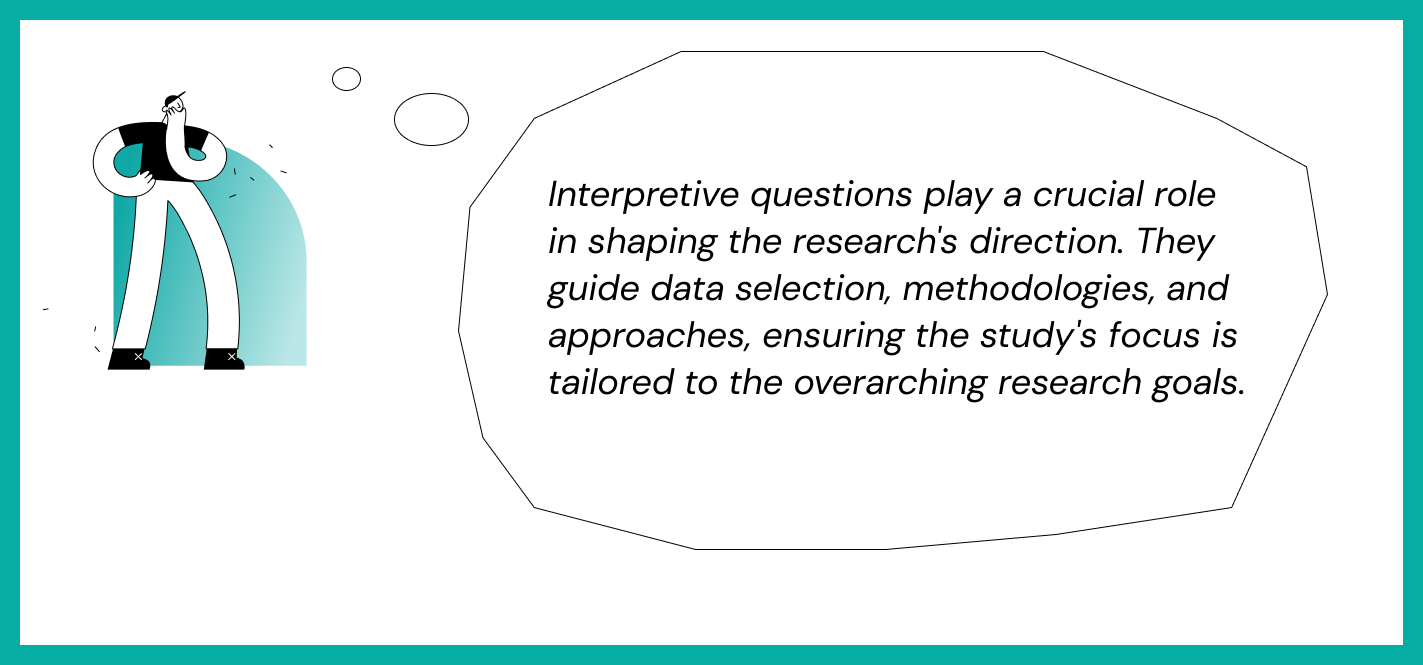So, what is an interpretive question? Interpret questions are important in various fields like literature, history, science, and everyday conversations. They help us understand complex topics by connecting raw data or information to a deeper level of comprehension. Here, we’ll explore interpretive questions, provide different perspectives, and share examples from academic Q&A websites to highlight their importance. Whether it’s understanding literary themes, untangling historical events, exploring scientific concepts, or improving everyday conversations, interpretive questions are essential tools that encourage critical thinking and deeper exploration.
Crafting interpretive questions requires not only analytical skills but also strong writing abilities. For those working on research projects involving complex interpretations, our research paper writing service can provide expert assistance to bring your ideas to life.
Interpretive Questions Examples: Unpacking the Concept
Definition of interpretive questions: Interpretive questions, often called questions of interpretation, prompt individuals to analyze and understand information or situations. Unlike straightforward, factual questions with one correct answer, interpretive questions stimulate critical thinking and the exploration of multiple viewpoints.
Consider these examples that show the nature of interpretive questions:
- Literary interpretation. In literature, readers typically encounter interpretive questions that encourage analysis of characters, themes, and symbols. For example, “What is the significance of the green light in ‘The Great Gatsby’?”
- Historical inquiry. Historians use interpretive questions to gain deeper insights into past events. An example might be, “What factors contributed to the fall of the Roman Empire?”
- Scientific exploration. In science, the question of interpretation drives research and experimentation. A sample would be, “What are the possible explanations for the observed patterns in this dataset?”
- Everyday conversations. Even in everyday conversations, we use interpretive questions to understand others better. For example, “Why do you think she reacted that way when you talked about that situation?”
These interpretive questions examples showcase the skillfulness of interpretive questions across various domains. They encourage individuals to explore meaning, significance, and deeper connections within a specific context. Interpretive questions are invaluable tools for fostering critical thinking and understanding the world around us. They also serve as catalysts for insightful discussions and help individuals gain a more profound insight into complex subjects.
What Is an Interpretive Question in Research Papers?
So, what is an interpretive question in research papers? An interpretive question is fundamental for delving deeper into the subject. It is key in guiding the research process and enabling a reflective exploration of the chosen topic. Unlike straightforward, factual inquiries or exemplification essays, interpretive questions are open-ended and internal. Let’s explore the nature and significance of interpretive questions in research papers.
At its core, an interpretive question prompts researchers to analyze, interpret, and critically evaluate the data or information they encounter during their investigation. It encourages them to go beyond the surface and consider various angles, perspectives, and potential meanings within the context of their study.
The beauty of interpretive questions lies in their ability to foster critical thinking. They require researchers to reflect on the implications of their findings, the significance of their results, and the broader implications for the field of study.

For example, in a research paper exploring the impact of climate change on biodiversity, a factual question might be, “What is the current rate of species extinction due to positive climate change?” While this question seeks a straightforward answer, it doesn’t invite in-depth analysis or interpretation.
Interpretive questions also play a crucial role in shaping the research’s direction. They guide data selection, methodologies, and approaches, ensuring the study’s focus is tailored to the overarching research goals.
Developing interpretive questions is a vital part of many academic assignments, including term papers. If you’re looking for tailored support, our custom term paper service is here to help you create a well-structured and insightful paper.
Interpretive Questions from Different Perspectives
Now that we have a basic understanding of interpretive questions, let’s probe them from different perspectives.
Recommended reads
Interpretative questions in Literature
In literature, interpretative questions are needed for literary analysis. They help readers explore the complexities of a text and encourage them to uncover underlying themes and symbols. For example:
- “How does the author use symbolism to convey the protagonist’s inner struggles?”
- “What do you think the author is trying to communicate about human nature through the actions of the main character?”
When using interpretive questions to look at literature, you understand the book better and notice all the small clues, making you like it even more.
Interpretive questions in History
Historians rely heavily on interpretive questions to piece together the puzzle of the past. Interpretive question examples:
- “What were the social, economic, and political factors that led to this negative historical event?”
- “How did different perspectives and biases influence the documentation of this era?”
Historians can construct a more comprehensive and objective account of historical events. Interpretive questions in history enable researchers to consider the multiple facets and motivations behind significant moments.
Interpretive questions in Science
In science, interpretive questions are instrumental in the research process. A scientist uses them to explore hypotheses–this makes sense of data and helps to generate new knowledge. For instance:
- “What are the underlying patterns in these experimental results, and what do they suggest about the phenomenon being studied?”
- “How might our interpretation of these findings change if we consider alternative explanations?”
These questions guide scientists in their quest for a deeper understanding of the natural world, encouraging them to consider various angles and possibilities.

Interpretive questions in everyday conversations
In daily interactions, interpretive questions help us navigate social situations and gain insight into others’ thoughts and emotions. Interpretation questions examples:
- “Why do you think they seem upset today?”
- “What could be the few reasons behind their sudden change in behavior?”
- What do you think about understanding misogyny and chauvinism?
Interpretive statement examples in conversation demonstrate our capacity for empathy and our willingness to understand others on a deeper level.
Test yourself: Which of the following is an example of an interpretive question?
Understanding interpretive questions is crucial for developing critical thinking skills and enhancing one’s ability to engage with complex topics. Let’s explore the quiz, “Which of the following is an example of an interpretive question?” to identify an example of an interpretive question from a set of options:
- “What is the capital of France?” This question seeks a straightforward, factual answer: Paris. It does not invite interpretation or critical analysis and is not an interpretive question.
- “How does the use of some color in this painting contribute to its overall mood?” This question goes beyond seeking a mere fact; it prompts an analysis of artistic elements and their impact on the painting’s mood. Therefore, it is indeed an interpretive question.
- “What is the boiling point of water at sea level?” Similar to the first question, this one seeks a precise, factual response: 100 degrees Celsius or 212 degrees Fahrenheit, depending on the scale. It does not invite interpretation or analysis and is not an interpretive question.
- “When was the Declaration of Independence signed?” Like the first and third questions, this query has a specific, factual answer: July 4, 1776. It does not encourage interpretation or critical analysis and is not an interpretive question.
In this quiz, the second question, “How does the use of color in this painting contribute to its overall mood?” stands out as an example of an interpretive question. It is based on critical analysis and interpretation of the artistic elements in a painting, fostering a deeper understanding of the subject.
Identifying interpretive questions is essential, as they are key to stimulating critical thinking and encouraging individuals to explore complex topics from various angles. These questions are particularly valuable in fields such as literature, art, philosophy, and social sciences, where deep analysis and interpretation are integral to gaining a comprehensive understanding of the subject.
Concluding Remarks
Now, you know what is an interpretive question. Interpretive questions are like helpful tools we use in different areas, such as reading, history, science, and talking with others. They help us think deeply and understand things better. We explored these questions and gave examples to show how they work.
In research, mostly interpretive questions make us think harder about our findings. In books, they help us see hidden meanings and symbols. Historians use them to understand past events better, and scientists use them to study new things.
Even when we talk with a group of friends, interpretive questions help us understand their feelings and thoughts. We used a quiz to see how these questions work, and we discovered they’re important for thinking more deeply.
In short, interpretive questions are like keys that open doors to understanding. Whether it’s in books, history, science, or everyday conversations, these questions inspire us to think and learn more.





